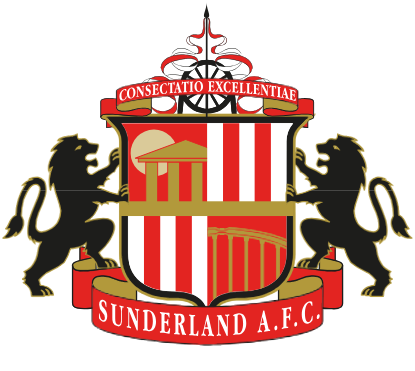
SAFC badge #discoversunderland.com
Sunderland Association Football Club, affectionately known as “The Black Cats,” has a storied history that resonates deeply with its loyal fan base. From its foundation in the late 19th century to its memorable triumphs and enduring connection with the community, Sunderland AFC represents the heart and soul of Wearside.
Foundation and Early Years
Sunderland AFC was officially founded in 1879 by schoolteacher James Allan, making it one of the oldest professional football clubs in England. Initially formed as Sunderland and District Teachers AFC, it quickly opened its membership to non-teachers and adopted its current name in 1881. The club joined The Football League in 1890, becoming the first team to do so from outside the original league’s founding members.
During its early years, Sunderland was a dominant force in English football. The club earned the nickname “The Team of All Talents” after winning its first Football League Championship in the 1891-92 season. The title was just the beginning of a golden era that saw Sunderland secure five league titles by 1936, a testament to the team’s strength and skill during this period.
Famous Players
Over the decades, Sunderland has been home to a host of legendary players who have left their mark on football history.
Charlie Buchan
One of the most iconic figures in Sunderland’s history is Charlie Buchan, who played for the club between 1911 and 1925. Renowned for his prolific goal-scoring ability, Buchan netted an astonishing 209 goals in 379 appearances. He was also a pioneer off the pitch, later becoming a respected football journalist and contributing to the development of modern tactical approaches.
Raich Carter
Another Sunderland legend is Raich Carter, a local hero who epitomised the club’s ethos of hard work and flair. Carter was instrumental in Sunderland’s 1936 league title triumph and captained the team to FA Cup glory in 1937, when Sunderland defeated Preston North End 3-1 in the final at Wembley.
Len Shackleton
Known as “The Clown Prince of Football,” Len Shackleton was a flamboyant and skillful player who entertained fans with his dazzling dribbles and cheeky personality. Shackleton joined Sunderland in 1948 and remained a fan favourite for a decade, becoming one of the most celebrated players of his era.
Kevin Phillips
Fast forward to the late 1990s and early 2000s, and Kevin Phillips stands out as a modern-day hero. Phillips won the European Golden Shoe in the 1999-2000 season, scoring 30 league goals—an achievement that remains unmatched by any English player in Premier League history.
Niall Quinn
Irish striker Niall Quinn is another beloved figure in Sunderland’s history. Quinn joined the club in 1996 and became known for his goalscoring prowess and leadership qualities. After retiring, he served as chairman, playing a key role in stabilising the club during challenging times.
Jordan Pickford
A product of Sunderland’s academy, Jordan Pickford has become one of England’s most recognisable goalkeepers. Born in Washington, Tyne and Wear, Pickford rose through the ranks to make his first-team debut for Sunderland in 2016. His impressive performances earned him a move to Everton and subsequently the England national team, where he played a starring role in England’s run to the final of Euro 2020.
Sunderland Women’s Football Team
Sunderland is not just a city of football for men—its women’s team has a rich history and a growing legacy that mirrors the passion of the men’s side. The Sunderland Women’s Football Club was established in 1989 and has since grown into one of the most competitive and respected teams in women’s football.
A Trailblazing Legacy
The Sunderland Women’s team has produced some of the finest talents in English football, including Lucy Bronze, widely regarded as one of the best female players in the world, and Jordan Nobbs, a standout midfielder for Arsenal and England.
Competitive Success
The women’s team has enjoyed success across various levels of competition, including winning the FA Women’s Premier League Northern Division multiple times. Their achievements have paved the way for greater recognition of women’s football in Sunderland and beyond.
Community Engagement
Like the men’s team, Sunderland Women’s Football Club is deeply connected to the local community. They play their home games at Eppleton Colliery Welfare Ground, where fans can enjoy high-quality football in an intimate and welcoming environment. The team’s commitment to inspiring young girls to take up the sport has had a transformative impact on women’s football in the region.
Roker Park: The Original Fortress
Before the move to the Stadium of Light, Sunderland played their home games at Roker Park, a ground that holds a special place in the hearts of older fans. Opened in 1898, Roker Park quickly became one of the most atmospheric and beloved football venues in the country.
Iconic Moments
Roker Park was the stage for countless iconic moments in Sunderland’s history. One of the most memorable came in 1973, when the team defeated Leeds United 3-0 in an FA Cup replay under the lights, showcasing the magic of midweek football.
The Final Goodbye
The ground’s history came to an end in 1997, when Sunderland moved to their current home, the Stadium of Light. The final match at Roker Park was a friendly against Liverpool, marking the end of an era steeped in nostalgia and unforgettable memories.
The Stadium of Light
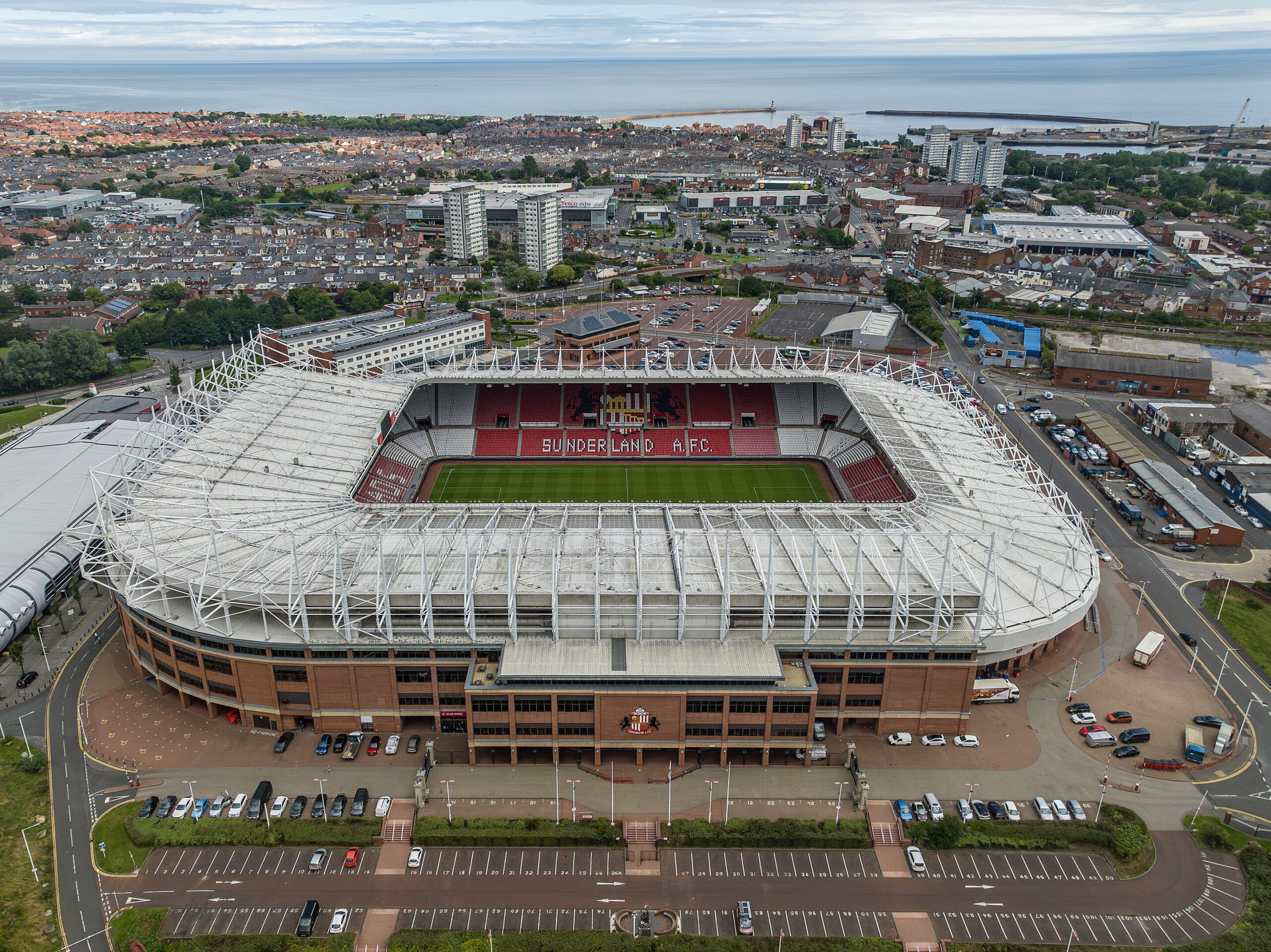
The move to the Stadium of Light marked a new chapter for Sunderland AFC. Opened in 1997, the 49,000-seat stadium is one of the largest in the UK and reflects the club’s ambition to compete at the highest level. The stadium’s name pays homage to the region’s coal mining heritage, with a symbolic Davy lamp featured prominently in its design.
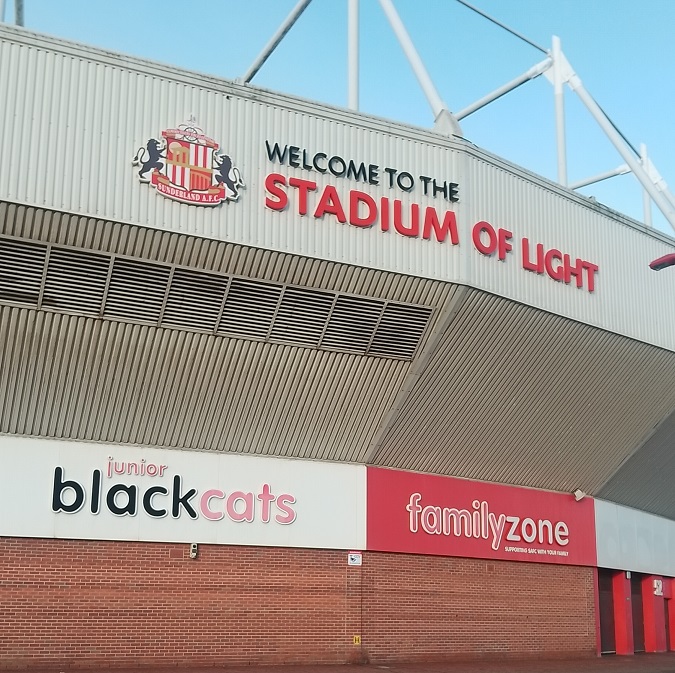

Major Honours
Sunderland’s illustrious history includes an impressive collection of trophies:
League Titles
- Football League First Division (now Premier League): 6 titles (1891-92, 1892-93, 1894-95, 1901-02, 1912-13, 1935-36)
FA Cup Triumphs
- FA Cup: 2 victories (1937, 1973)
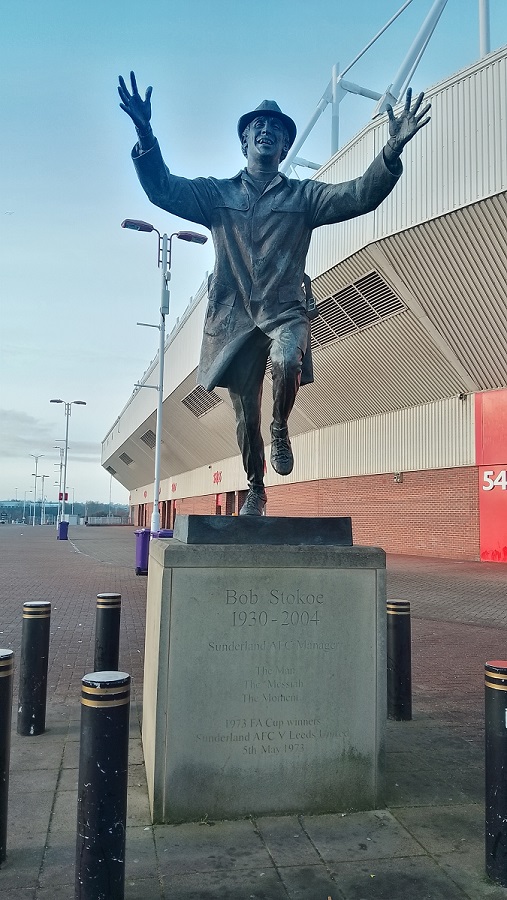
The 1973 FA Cup win remains one of the greatest achievements in Sunderland’s history. Managed by Bob Stokoe, the team pulled off a stunning 1-0 victory over the mighty Leeds United, with Ian Porterfield scoring the decisive goal. It was a true underdog story, and the image of Stokoe running across the Wembley pitch to celebrate with his players is etched into football folklore.
Other Honours
- Football League Championship (Second Division): 5 titles
- Football League Cup Finalists: 1985 and 2014
Rivalries and Passion
Sunderland’s fierce rivalry with Newcastle United is one of the most intense in English football. Known as the Tyne-Wear Derby, matches between the two teams are highly anticipated events filled with passion and pride. The rivalry extends beyond football, reflecting the cultural and industrial history of the North East.
Matchday Experience at the Stadium of Light
Matchdays at Sunderland AFC’s Stadium of Light are a spectacle that every football fan should experience. The stadium, with its capacity of over 49,000, transforms into a sea of red and white as fans pour in to support the lads, their beloved Black Cats. From the moment you arrive, the energy and anticipation are palpable, making matchdays more than just a game—they’re a celebration of football, community, and tradition.
Pre-Match Atmosphere
The build-up to a match at the Stadium of Light starts long before kick-off. Outside the ground, the atmosphere is electric as fans gather to soak up the pre-game buzz. Local pubs and food stalls in the vicinity of the stadium hum with activity, offering everything from classic matchday pies to pints of beer.
Live performances and music often set the tone for the day, while fan zones provide entertainment for families and children. You can pick up club merchandise at the official store or pose for a photo with the stadium’s iconic Davy Lamp statue—a nod to the city’s coal mining heritage.
The Walk to the Stadium
Walking across the Wearmouth Bridge toward the Stadium of Light is a rite of passage for Sunderland fans. As you approach the ground, the chants and songs of supporters echo in the air, creating a sense of unity and anticipation that’s impossible to ignore. The sight of the stadium, proudly perched along the River Wear, adds to the excitement.
Inside the Ground
Once inside, the sheer scale and atmosphere of the Stadium of Light take over. The seating offers excellent views from every angle, and the roar of the crowd as the teams walk out is nothing short of spine-tingling. The stadium’s acoustics amplify the fans’ voices, turning every chant and cheer into a thunderous display of passion.
Matchday traditions like singing “Can’t Help Falling in Love”, “Ready to Go”, “Sunderland Till I Die” or the classic “Haway the Lads”. Whether it’s a league match, a cup tie, or a derby against Newcastle United, the intensity of the crowd elevates the game to another level.
Matchday Food and Facilities
The Stadium of Light offers a variety of food and drink options, from traditional football fare like burgers and hot dogs to more contemporary choices. Family-friendly zones and accessible facilities ensure that all supporters, regardless of age or ability, feel welcome and catered for.
Post-match, the celebrations or commiserations continue as fans spill into nearby pubs and restaurants, discussing every play, goal, or near miss with unrelenting enthusiasm.
Fan Culture: The Heartbeat of Sunderland AFC
The fans of Sunderland AFC are the lifeblood of the club, known for their unwavering loyalty, passion, and deep-rooted connection to the team. Supporting Sunderland is about more than just football—it’s about identity, pride, and a shared sense of belonging.
The Roker Roar
The famous “Roker Roar,” named after the club’s former home ground, Roker Park, epitomises the passion of Sunderland supporters. Even though the team now plays at the Stadium of Light, the spirit of the Roker Roar lives on, with fans creating a deafening atmosphere that intimidates opponents and inspires players. On a windy day, you can hear the Roker Roar miles away.
Away Day Adventures
Sunderland fans are known for travelling in large numbers to support their team, no matter the distance or circumstances. Away days are a unique aspect of fan culture, where camaraderie and adventure take centre stage. The chants, flags, and energy brought by Sunderland supporters often make them the “12th man” on the road.
Community and Legacy
Beyond the pitch, Sunderland AFC has always been deeply connected to its community. The club’s charity foundation, Foundation of Light, is one of the largest football-affiliated charities in the UK. It delivers educational programmes, health initiatives, and community development projects that make a tangible difference in people’s lives.
Challenges and Resilience
Like many football clubs with a long history, Sunderland has faced its share of challenges. Relegation battles, financial struggles, and managerial changes have tested the resilience of both the club and its fans. However, the unwavering support of the Sunderland faithful continues to drive the team forward, embodying the motto “Keep the Faith.”
A Club with Heart
Sunderland AFC’s history is more than just a timeline of matches and trophies. It’s a story of triumph, perseverance, and an unbreakable bond with its supporters. From the glory days at Roker Park to the hopes of a brighter future at the Stadium of Light, the club remains a beacon of pride for Wearside.
As Sunderland looks to write the next chapter of its journey, the passion of its fans and the enduring spirit of the Black Cats ensure that its legacy will continue to inspire for generations to come.
Location & Contact Details
Stadium of Light, Sunderland, SR5 1SU
Phone: 03719111200; email: [email protected]

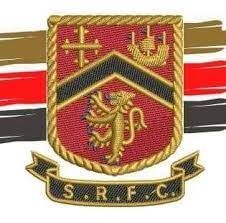
![{"capture_mode":"AutoModule","faces":[]}](https://discoversunderland.com/wp-content/uploads/2025/04/boating_lake_Roker_Park-768x704.jpg)
![{"capture_mode":"AutoModule","faces":[]}](https://discoversunderland.com/wp-content/uploads/2025/01/Molly.jpg)